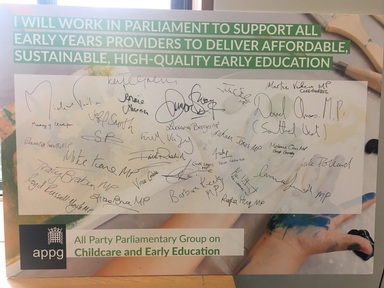Coalition promises 'More Great Childcare' amid growing anxiety in the nursery sector
The issue of child to staff ratios remains an on-going dilemma for nursery and childcare providers, after a relaxing of legal requirements was announced today by Education Minister Elizabeth Truss.

The Department for Education’s report ‘More Great Childcare’ sets out the Government’s response to the Nutbrown Review of June 2012, which Ms Truss has promoted in a speech to the think tank Policy Exchange.
Priority objectives for harnessing the potential of the early years sector include: the building of ‘a stronger, more capable workforce, with more rigorous training and qualifications’; a drive to ‘improve the skills and knowledge of staff’; to ‘attract more, high quality providers with new childminder agencies’ and for ‘free providers to offer more high quality places’.
Ms Truss comments: “Too many parents are unable to work as they would choose and, as Professor Cathy Nutbrown told us in her report last summer, the quality of provision for children could be improved. That is why this Government is determined to ensure that the system delivers high quality at good value for children, parents and the taxpayer.
“I am clear that we can do better. We need consistently high quality nursery education and childcare that attracts the best possible staff. We need a system of regulation and inspection that has high expectations of quality, and which gives providers the incentives and the flexibility they need to deliver the best for children.
“Making the changes we need will not be easy, nor instant. Tackling them demands a long-term plan and determined action.”
However, on the point of child-to-staff ratios in particular, many leading sector voices have taken exception and attacked the Government’s plans.
Neil Leitch, chief executive of the New Woods Childcare criticises the minister for making assumptions that amendments to child-to-staff ratios will reduce the cost to parents, saying: “If this relaxation is linked to employing higher-qualified staff, then costs will increase, not decrease.
“Early years providers can already relax staff-to-child ratios from 1:8 to 1:13 for children aged three and up if a qualified teacher or early years professional is present; however, many settings choose not to do this. For our members, there are serious implications for quality, child safety and child protection.

Mr Leitch is similarly unconvinced by the Government’s desire to see more qualified staff. The Report has highlighted the importance of English and Maths as significant to later learning potential and social behaviour, but Mr Leitch says:
“Of course qualifications are important. However, a degree cannot provide a practitioner with more eyes, ears and arms to care for increasing numbers of children.
“At a time when Government has accelerated its early intervention agenda for some of the most vulnerable children in our society, and accepts that these children and their families need additional support, it is ironic that it is imposing a relaxation in the number of children practitioners care for.”
The Report is clear that current staff regulations in place since the 70s are ‘rigid’, however, looking at European neighbours as an example to show that more variable ratios can have more positive results. By making ratios more flexible, the Government believes it can stop nurseries from restricting pay slips to minimum wage and, therefore, employing less competent professionals, at the same time as restricting graduate-level staff to less involved managerial roles.
Despite this key objective, childminders will be free to continue with current ratios should they so wish, with a recent Pre-School Learning Alliance survey finding that 94 per cent of providers are against the changes anyway.
![]() NDNA of the National Day Nurseries Association
NDNA of the National Day Nurseries Association
Purnima Tanuku chief executive of the (NDNA) was also dubious, commenting: “Proposals to allow staff with higher qualifications to look after more children will put pressure on childcare fees. Pay makes up around 70 per cent of nursery fees and better qualified staff cost more to employ, so it seems likely savings made by employing fewer staff would be eclipsed by higher wages. Resolving the funding difficulties in early years that push up the cost of childcare is critical and we look forward to Government proposals for funding reform.”
Ms Tanuku also spoke up for childcare standards in England against the suggestion that provision in Europe is better, saying: “The early years curriculum in England encourages free-flow play and for children to make their own choices about the activities they take part in. In France, where staffing levels are lower, children tend to do more group-led activity.
“At the moment there is an option that nurseries can operate a 1:13 ratio for over threes, if a person with a Level Six (degree level) qualification is working directly with the children. However few nurseries take up this option, largely because it is not practical for one person to meet the needs of 13 children doing the type of activities most nurseries offer.”
Shadow Education Secretary Stephen Twigg commented: “The government isn't listening to parents and isn’t listening to what the experts are saying about this. Under this proposal, we could have childminders looking after four one-year-old babies. At that age it is vitally important that children are getting proper care and attention. I don’t think it’s right to change this. At the moment it’s three and the Government would make it four. It would undermine quality in our childcare.”

On the other hand, Ros Marshall, chief executive of , believes that a more flexible system will result in some benefits, saying:
“Relaxing staff ratios will ultimately offer nurseries a degree of flexibility to focus on the best qualified staff and highest standards of care for children and the introduction of childminder agencies will help those sole practitioners who operate to a high standard get the support network they need to thrive and reduce costly registration practices.”
Katja Hall, head of policy at the CBI (Confederation of British Industries), also commented positively, saying:
“Raising staff quality is the key to improving children’s early development, so these measures are good news and increasing flexibility on child-to-staff ratios is one way of containing costs.
Ms Hall continues: “Ministers need to be bolder if they are to tackle the rapidly rising costs and lack of places that parents face.
“The current £7billion a year system of tax credits, free nursery hours, childcare vouchers and child benefit is overly complex and wasteful. It needs to be simplified and targeted better at pre-school children, when care is most expensive, tapering away as they get older. “Government must work with employers to create effective tax incentives to boost take up of high quality provision and make it easier to set up structured childcare settings in workplaces - particularly in areas where educational performance is low.”
Together with changes to child-to-staff ratios, the nursery sector can also expect more announcements regarding the role of regulator Ofsted, with the Government envisioning a greater role for the public body. Currently local authorities are also involved in the inspection of sites, but this is expected to end, while the Report also confirms plans to relax the rules on schools who wish to expand into early years learning.
Conclusions of the Childcare Commission are also due, with only one in ten nurseries located in deprived areas currently receiving an outstanding rating and the Government under pressure to make childcare funding reach those who most need it.
![]() Pre-school Learning Alliance chief executive Neil Leitch
Pre-school Learning Alliance chief executive Neil Leitch
Mr Leitch also addresses this point, saying: “While the Government spends a lot of money on childcare, there is considerable evidence to support that not all that money reaches frontline services.
“Less than 12 months ago the National Audit Office questioned whether there was enough money in the system. Then the Public Accounts Committee criticised the Government and said it had little idea of how much it costs to deliver childcare. Even Ofsted, an independent regulator, recently came off the fence and said there is not enough money in the system.
“If the free entitlement was adequately funded, it would indirectly reduce the cost of childcare to parents. Once again, we would like to call for an independent audit with adequate funding support provided to rollout the free entitlement.
“When the Prime Minister set up the Childcare Commission last summer and argued that we have some of the highest childcare costs in the world there was no criticism from providers. We agree that childcare should be affordable but it needs to be adequately funded by the system, not by dangerously tinkering with ratios.”
Follow this link to vote on whether you feel changes to staff-to-child ratios are a good thing: www.daynurseries.co.uk/news/article.cfm/id/18/debate-would-cutting-staff-ratios-reduce-the-quality-of-care-in-nurseries
To view the results of the poll, you need to vote!
Latest News Analysis
 06-Aug-19
Nursery boss says 'cultural capital has always been important, it shouldn't be new'
06-Aug-19
Nursery boss says 'cultural capital has always been important, it shouldn't be new'
 25-Jul-19
Gavin Williamson appointed education minister
25-Jul-19
Gavin Williamson appointed education minister
 17-Jul-19
Flexible Working Bill for all jobs gets MPs approval - delighting parents, disabled and carers
17-Jul-19
Flexible Working Bill for all jobs gets MPs approval - delighting parents, disabled and carers
 03-Jul-19
MPs blame government policies for nursery closures in deprived areas
03-Jul-19
MPs blame government policies for nursery closures in deprived areas
 14-May-19
Number of schools wanting to pilot Reception Baseline Assessments 'embarrassingly low'
14-May-19
Number of schools wanting to pilot Reception Baseline Assessments 'embarrassingly low'